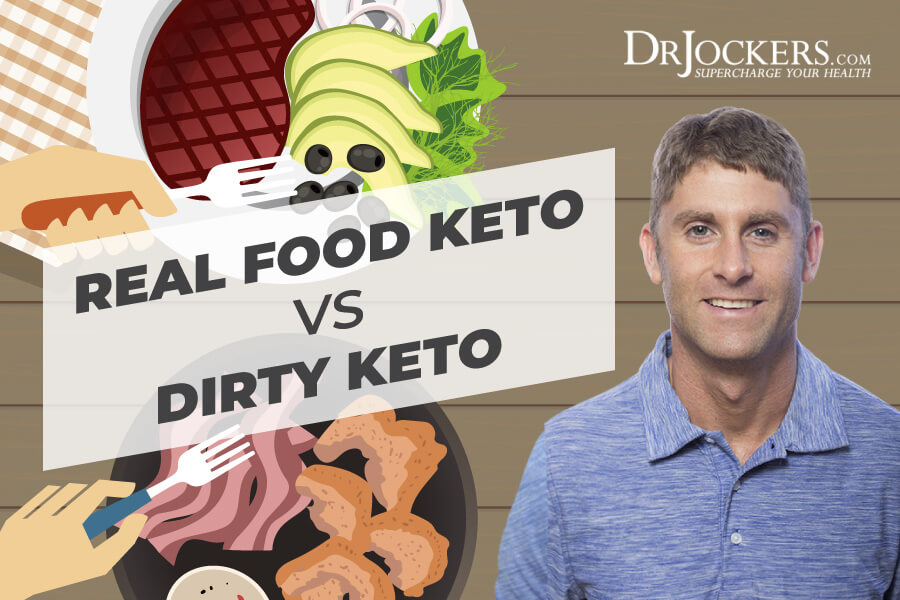
Real Food Keto vs Dirty Keto
The keto diet is an increasingly popular diet that focuses on getting most of your calories from fats and eating only a very limited amount of carbohydrates. While it’s popular, it is far from a fad. The keto diet is actually an incredibly healthy way of eating. It has numerous science-backed health benefits, including reduced inflammation, successful weight loss, improved fat burning, more energy, reduced cravings, clearer skin, and more mental clarity.
I must emphasize that if you are following a keto diet, it is essential that you are eating nutrient-dense foods full of micronutrients. It is easy to make the mistake and to focus only on your macros. However, if you rely on processed foods and processed meats too much, chances are, you will be missing out on all the health benefits that a micronutrient-rich real food keto diet can offer.
The real food keto diet is a nutrient dense way of eating that has tremendous health benefits. Unfortunately, with the success of the keto diet, many people have turned to a dirty keto approach. In this article, you will learn what real food is, a clean keto diet, how to do it, and why we want to avoid the dirty keto approach.
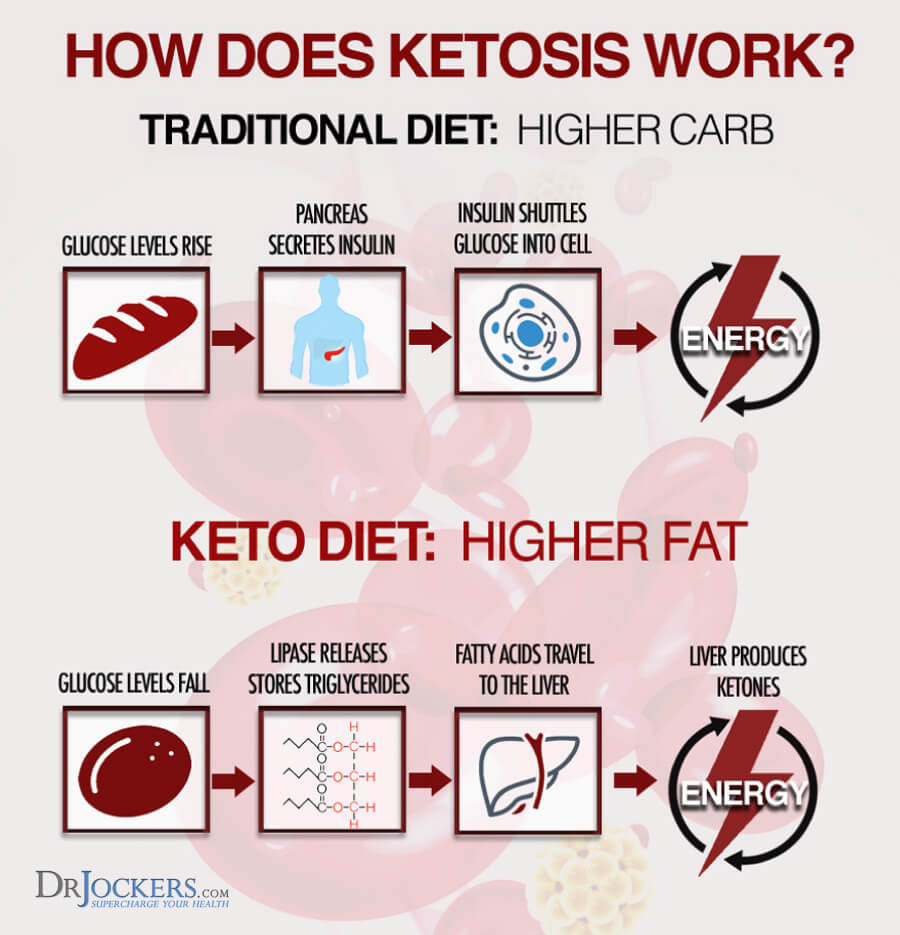
What Is the Keto Diet?
The ketogenic, or keto diet is a very low-carb diet plan. You may be surprised to hear that it dates all the way back to the 1920s. The keto diet was originally designed by researchers at the Johns Hopkins Medical Center working on ways to help patients with epilepsy. They found that intermittent fasting helped to reduce seizures in patients, and it also helped them lower their hunger levels, blood sugar, cholesterol, and body fat (1, 2).
Since long-term fasting is not feasible for more than a few days, they developed the keto diet that can mimic the benefits of fasting. By strictly limiting glucose from carbohydrate foods, the keto diet tricks your body into thinking that it’s fasting. At the heart of it, the keto diet works by restricting the intake of all sugars and carbohydrates and focusing on fat as a source of fuel by encouraging a 70% fat, 25% protein, and 5% carbohydrate diet plan.
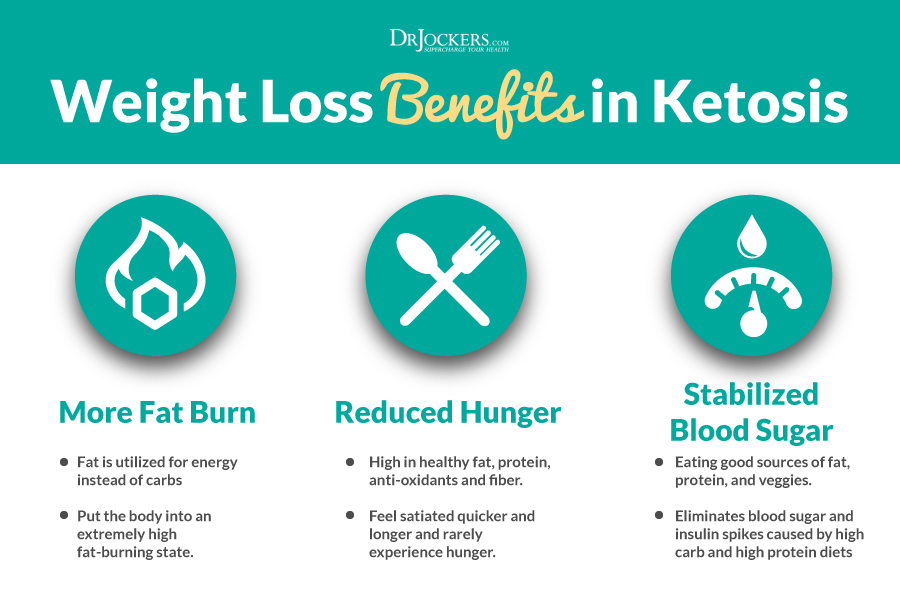
From Sugar Burner to Fat Burner
Normally, our bodies use glucose, or sugar, for energy. However, on a keto diet, when glucose is not available, your body learns to burn stored fat and fat from your food for fuel. The keto diet puts your body into something called ketosis, which is a metabolic state that happens when most of your energy comes from blood ketones instead of glucose.
As a result, your body is able to burn fat more effectively and help you lose weight more easily, which is one of the benefits many people love keto. They are also ideal for lowering inflammation and preventing chronic diseases (3, 4).
Since the main goal of the keto diet is to use fat as fuel instead of carbohydrates, some people forget that getting enough micronutrients is just as important as meeting their macronutrients. If you are eating a dirty keto diet relying on processed foods and processed meats, you may end up deficient in important micronutrients and as a result, you may run into health issues down the road. This is the reason why I emphasize it often that eating a real food keto diet high in vitamins, minerals, and enzymes is absolutely essential for your health.
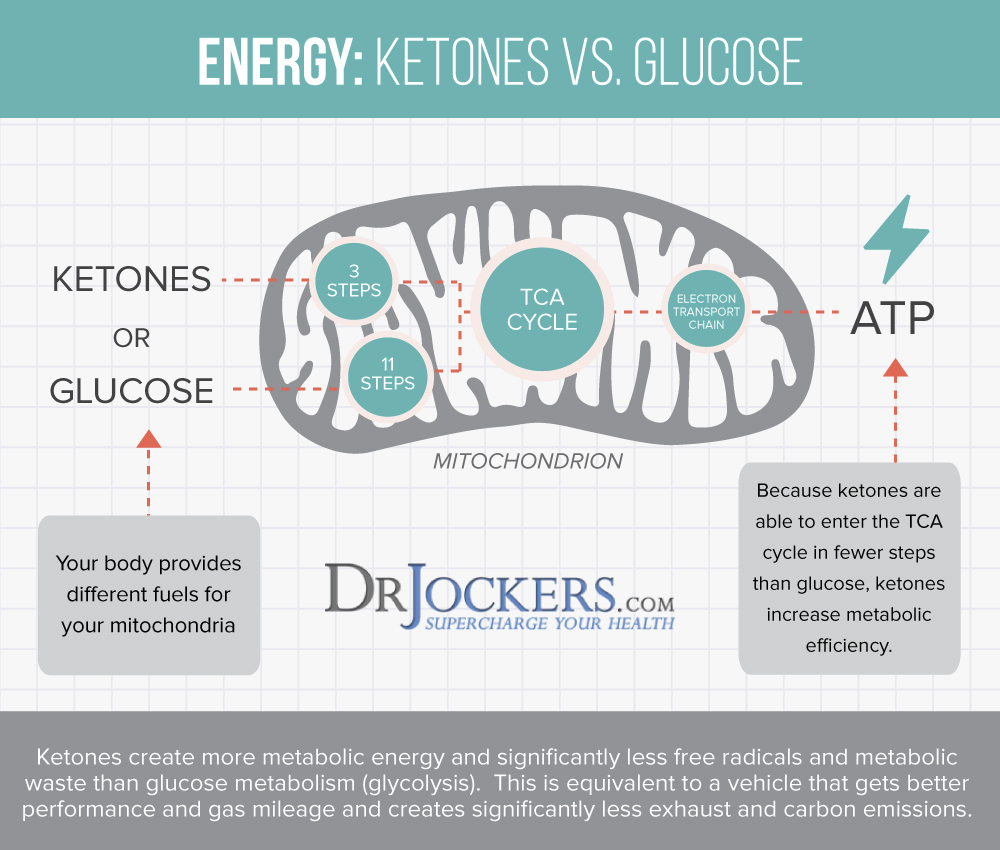
What Is Dirty Keto?
Dirty keto received its name because it doesn’t care how ‘clean’ is the food that you are consuming. The goal of the keto diet is to achieve ketosis by restricting your carb intake and getting most of your calories from fats. You have to make sure that 60 to 80 percent of your daily calories come from fat, 20 to 30 percent from protein, and 5 to 10 percent or less from carbs. When you follow the dirty keto, you are following the same breakdown of fats, protein, and carbs, however, it doesn’t matter what your macronutrients come from (5).
The real food keto diet may require a lot of research, planning, meal preparation, and cooking. Dirty keto, however, doesn’t require you to pay attention to the source of the quality of your nutrients. As long as you are meeting the right keto macro ratio, you are allowed to eat processed and junk food.
This means that you can get a burger with cheese but without the bun at any fast-food chain, processed meats from the grocery store, or chicken fried in refined oil, and call it keto. You may choose non-organic animal foods. You may drink diet sodas. You may even eat a small piece of candy, as long as your carb intake is at or under 5 to 10 percent of your calories.
While dirty keto may seem easier and more convenient, it is not the healthiest way to follow a keto diet. If you are following a dirty keto diet, you are losing out on the benefits of a nourishing real food keto diet.
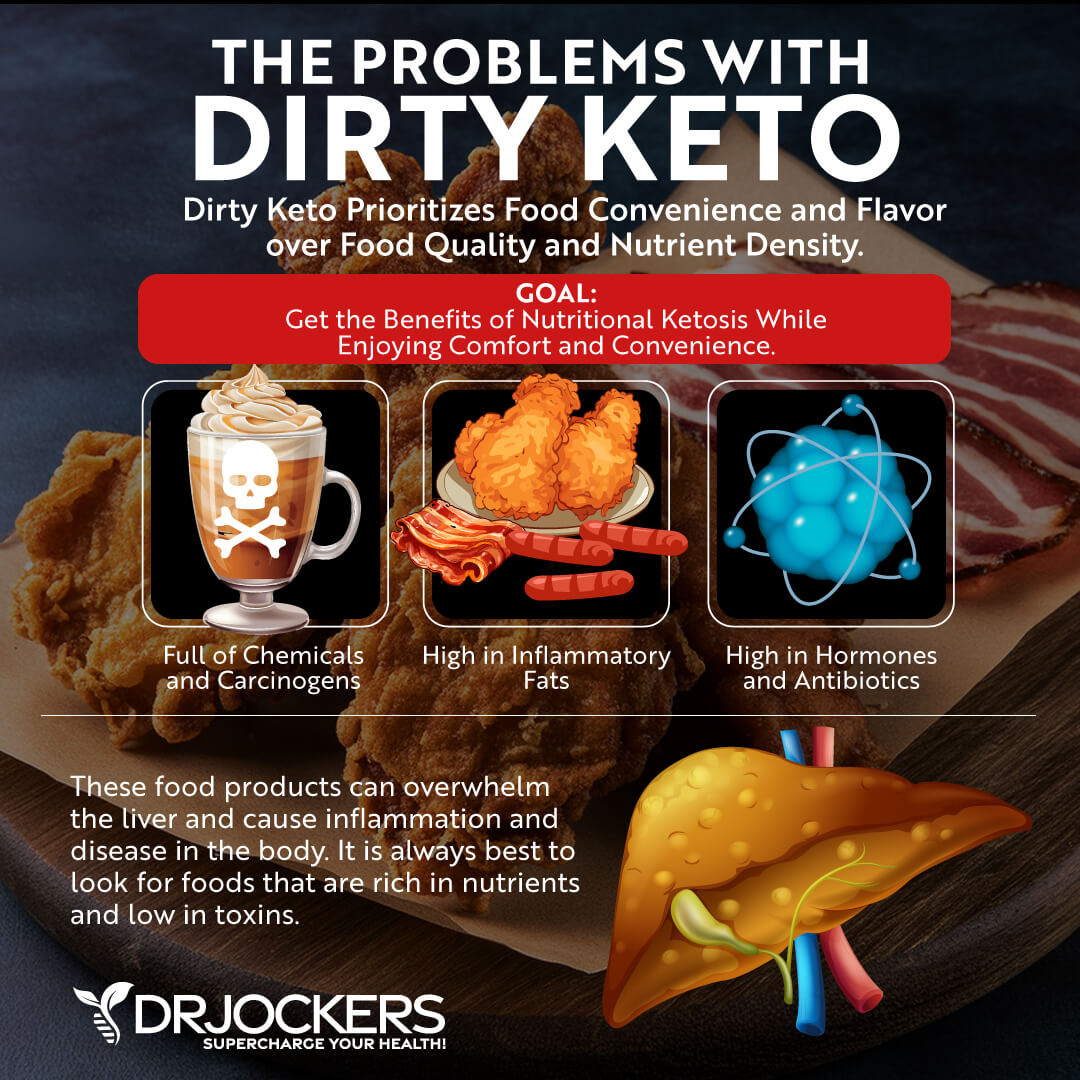
Drawbacks of Dirty Keto?
Dirty keto may be tempting, however, without focusing on clean, healthy, and nutrient-dense foods, you will be missing essential micronutrients, such as minerals, vitamins, and enzymes that are necessary for your health. Following dirty keto, you are running the risk of inflammation, cravings, bloating, rebound weight gain, low energy, compromised immunity, weak bones, and other health issues.
If weight loss is your goal, you may wonder if you can lose weight on a dirty keto diet. If you keep your keto macro ratios at the right balance and don’t overeat on calories, you may lose weight while following a dirty keto diet. However, because dirty keto is missing vital micronutrients, you may also run into health issues and may experience junk food cravings or rebound weight gain as well.
Processed foods often contain a lot of sodium, preservatives, and artificial ingredients that may result in bloating, puffiness, dehydration, and constipation. These inflammatory foods may increase your risk of experiencing symptoms of the keto flu as well. Nutritional deficiencies, in the long run, may compromise your health, and lead to inflammation, pain, and chronic health issues.
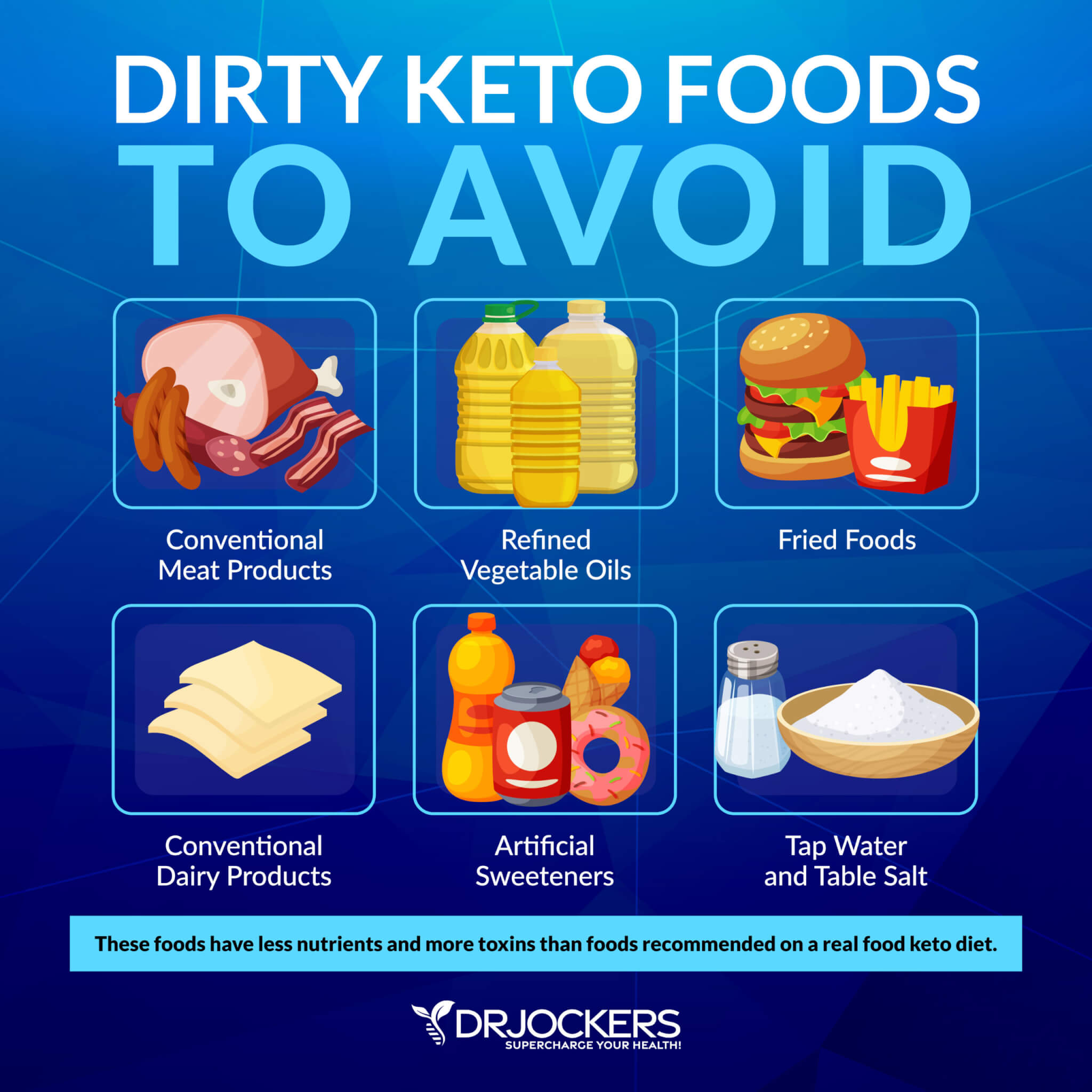
Dirty Keto and Leaky Gut
Leaky gut syndrome is one of the major problems that you may experience by consuming too many inflammatory, processed, and junk foods that are low in nutrients. A dirty keto diet that is heavy on inflammatory foods may disrupt your gut flora balance, damage your gut lining, and lead to intestinal permeability, which allows toxins, bacteria, and undigested food particles to enter your bloodstream.
Leaky gut may lead to chronic inflammation, digestion disorders, compromised brain health, chronic pain, chronic fatigue, autoimmune conditions, and other chronic health conditions. Hence, I recommend that you follow a real food keto diet with nourishing, nutrient-dense, clean, and healthy foods to support your overall health and well-being.
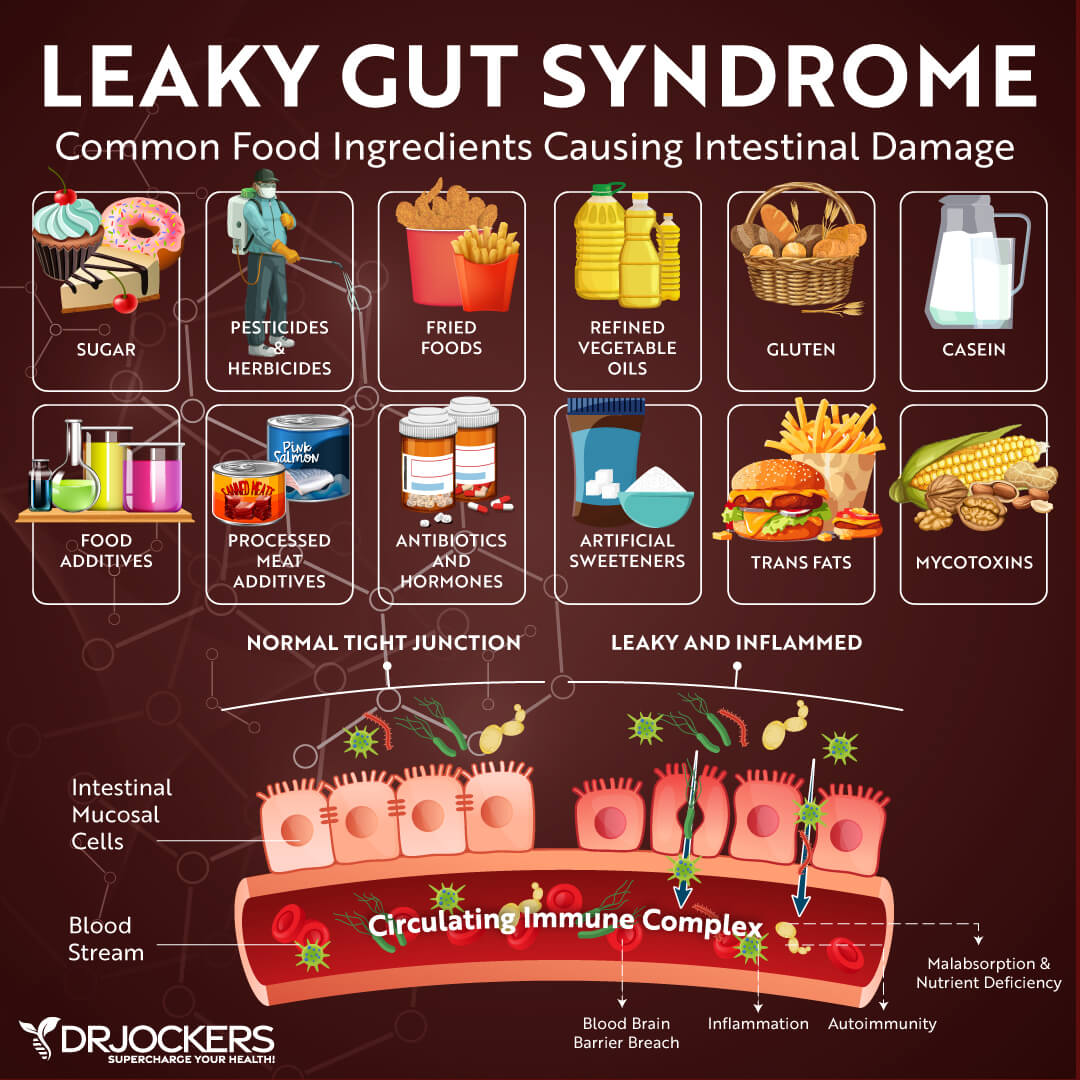
What Is the Real Food Keto Diet
The real food keto diet is also referred to as the clean keto diet. It is basically a healthy way of following a keto diet. The real food keto focuses on nutrient-dense whole foods from quality sources, such as grass-fed beef, pasture-raised poultry, free-range eggs, wild-caught fish, and plenty of nutrient-dense, low carbohydrate vegetables, low glycemic index fruits, herbs, and spices.
On a real food keto diet, you may meet all your micronutrient needs while also keeping your macronutrients in the keto zone.
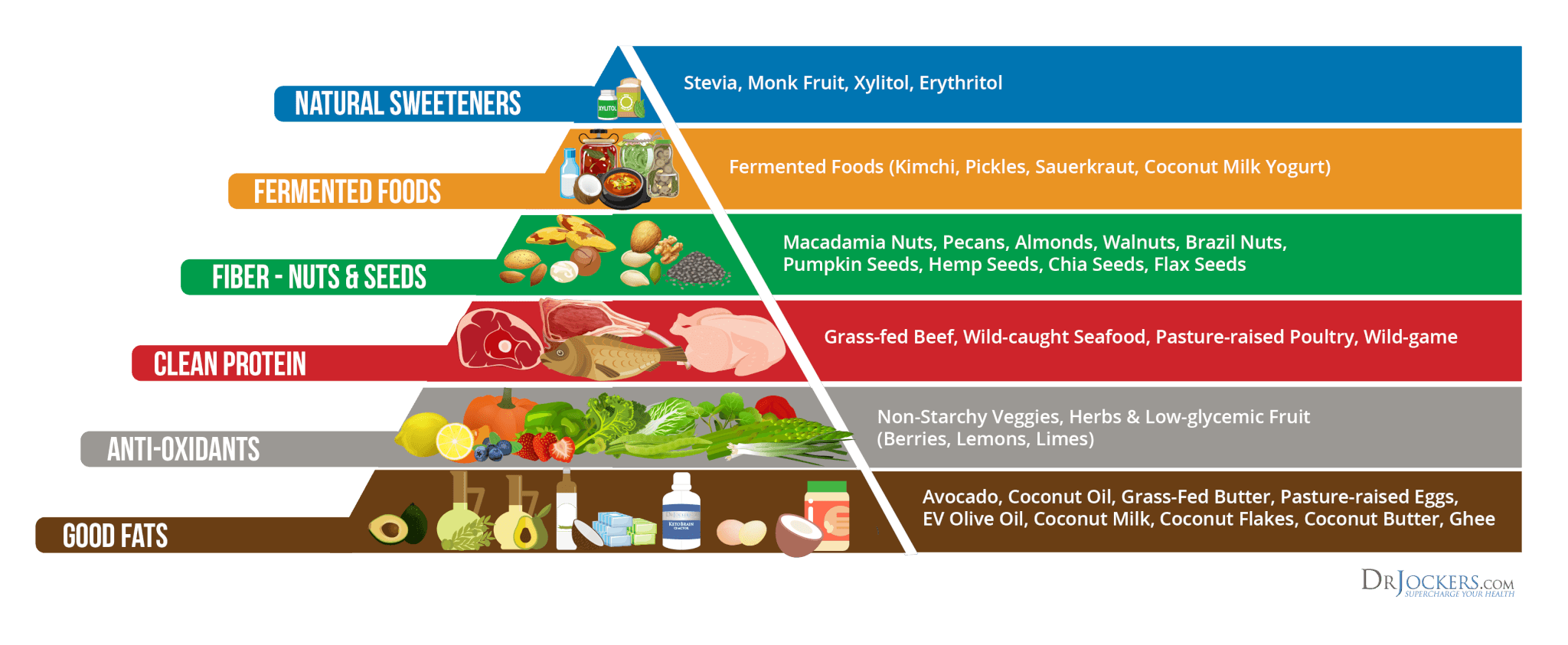
Benefits of the Real Food Keto Diet
Eating a real food keto diet rich in nutrient-dense foods, vitamins, minerals, and enzymes has an array of health benefits. Some of its benefits include:
- Reduced inflammation (6)
- Improved fat burning (7)
- Increased mental clarity and sharpness (8)
- More energy
- Clearer skin
- Reduced cravings
- Mitochondrial biogenesis (9)
- Reduced signs of aging (10)
- Reduced risk of chronic disease
If you want to learn more about the benefits of the real food keto diet, I recommend that you read this article.
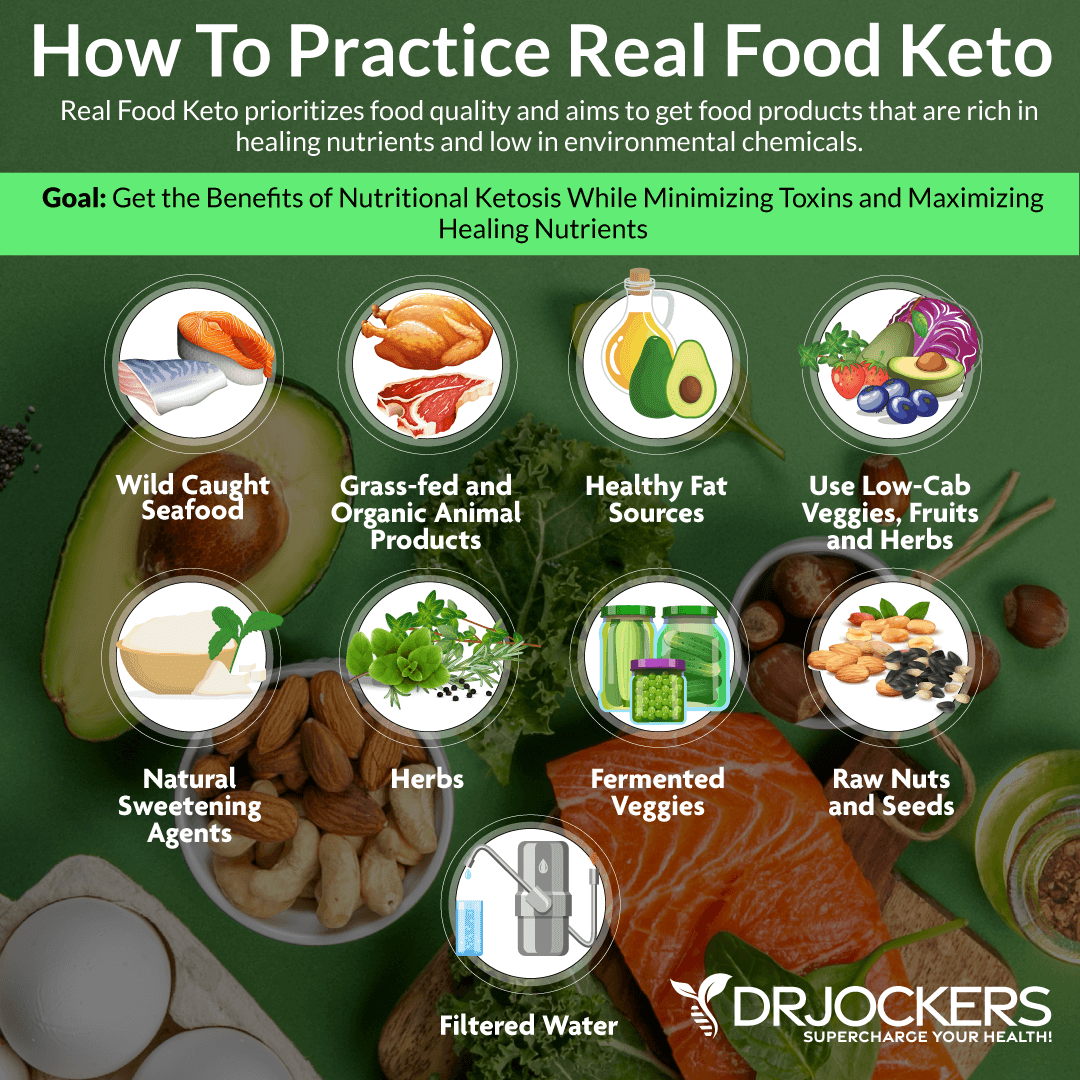
How to Practice the Real Food Keto Diet
To practice the real food keto diet, you need to focus on healthy whole foods that are full of micronutrients instead of processed foods and processed meats.
Healthy Fats
Healthy fats are the base of the real food keto diet. Most of your fuel should come from healthy, nutrient-dense, and anti-inflammatory fats.
Best healthy fat choices on a real food keto diet include avocados, avocado oil, coconut oil, coconut milk, coconut butter, grass-fed butter or ghee, olives, olive oil, MCT oil, and animal fats from pastured animals, such as lard and tallow. Make sure to take advantage of all this nutritious goodness, and eat a good variety.
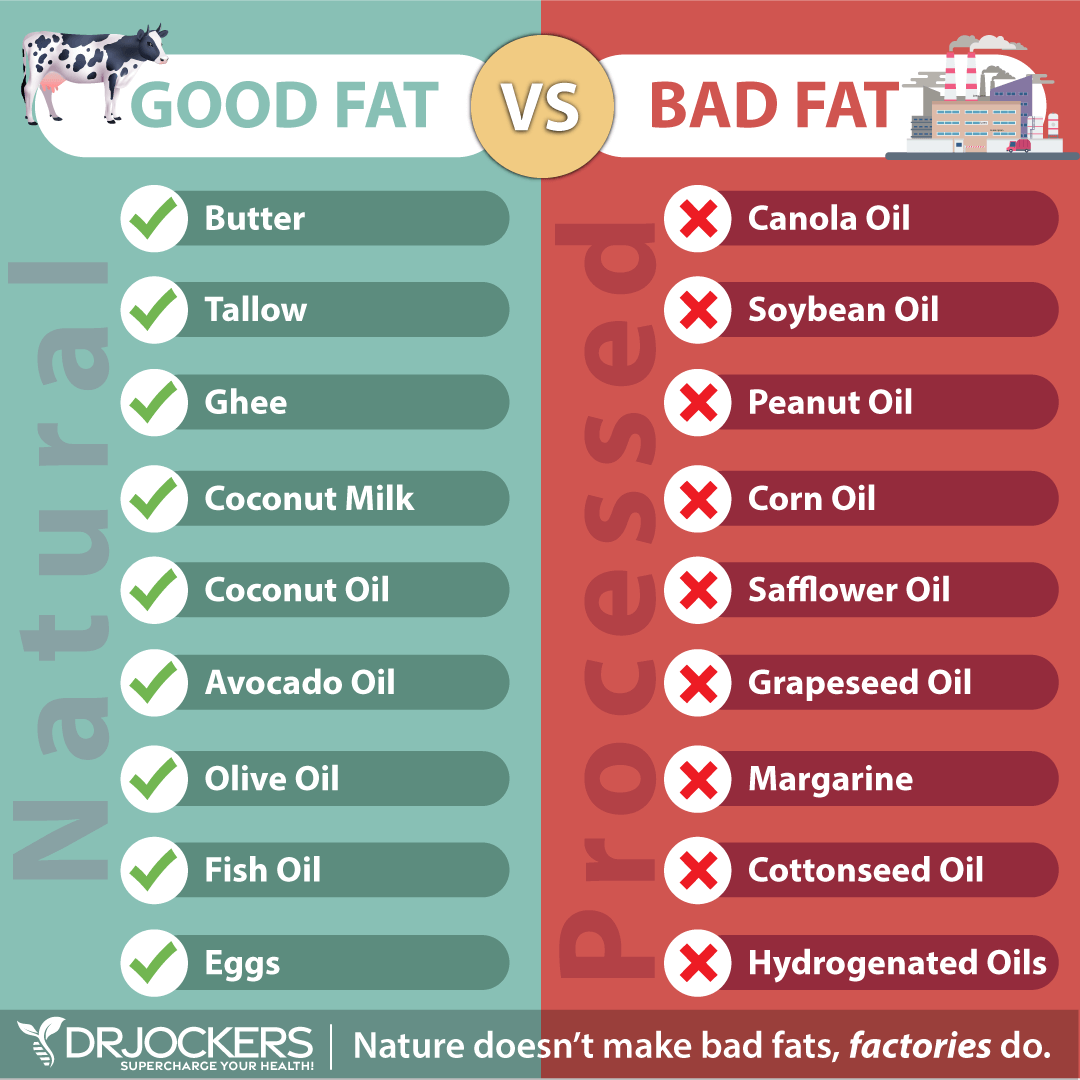
Antioxidants
Antioxidants are an incredibly important part of any diet, including real food keto. They help your body to lower inflammation, fight free radicals, and decrease the risk of disease. They also promote a healthy balance of gut bacteria with the help of prebiotics.
There are three primary groups of antioxidants: vegetables, low-glycemic index (low GI) fruits, and fresh herbs and spices. The best vegetables I recommend on a real food keto diet include onions, leeks, dark leafy greens, cauliflower, broccoli, cabbage, cucumbers, asparagus, Brussels sprouts, artichokes, radishes, celery, and garlic.
The best low GI fruits include lemons, limes, berries, olives, and avocados. My favorite herbs and spices to use on the real food keto diet are basil, oregano, turmeric, cinnamon, ginger, rosemary, and cardamon.

Clean Protein
Though the main energy source of a real food keto diet is healthy fats, eating enough quality protein is also important. While too much protein may stimulate your body to form glucose which may prevent you from entering ketosis, enough protein is important for building muscles and staying healthy. Keeping track of your macros, therefore, is incredibly important on a real food keto diet.
The best clean protein choices on a keto diet include pasture-raised beef, lamb, and bison, free-range chicken and turkey, and wild-caught fish. Pasture-raised eggs are another nutrient-dense clean protein source you may enjoy.
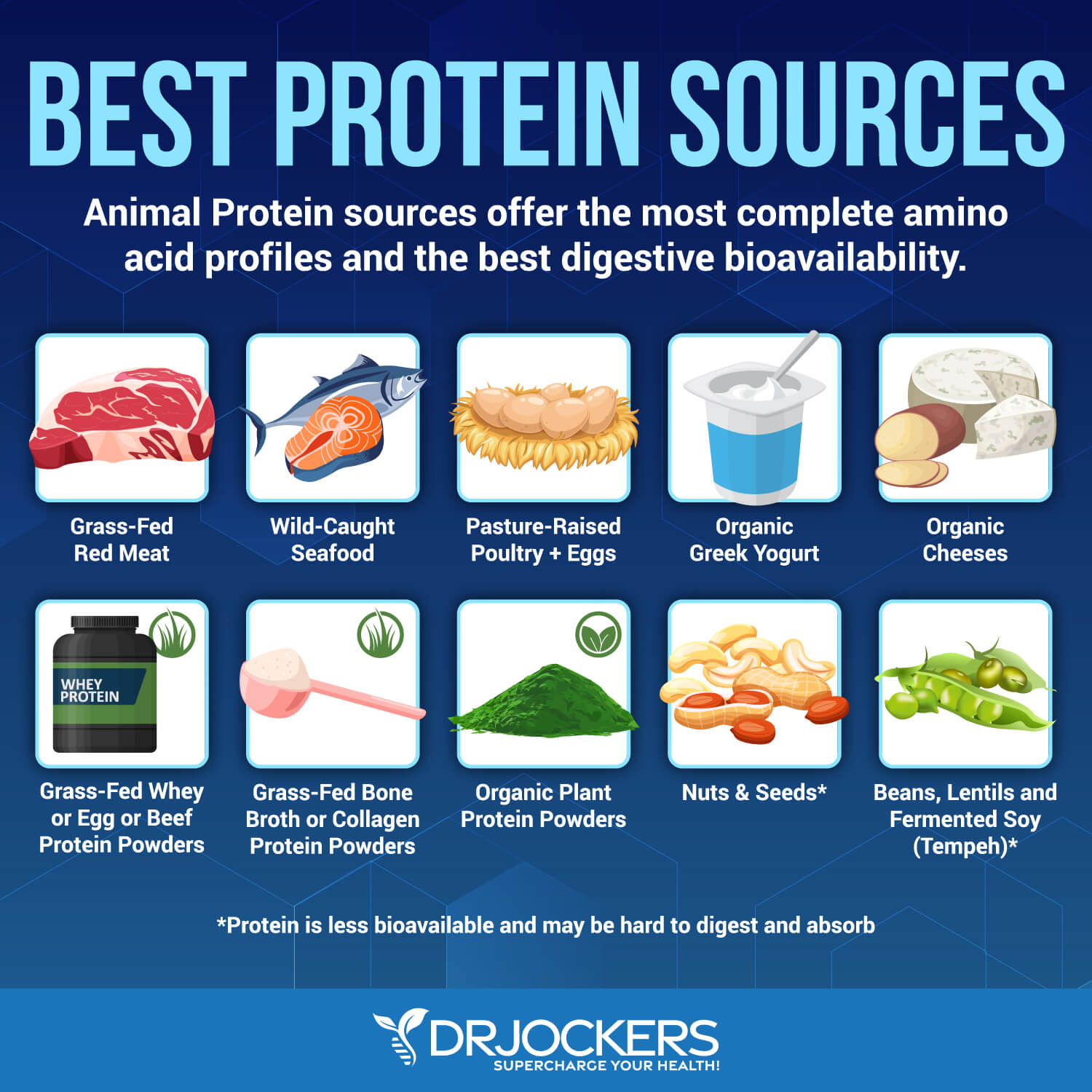
Fiber – Nuts and Seeds
Fiber is absolutely crucial for healthy digestion. Constipation is a common concern for people practicing keto. Eating plenty of fiber may prevent constipation and other tummy troubles. It may not only keep your regular, but may improve your microbiome, metabolism, immune system, and mental health.
Healthy fiber sources on a real food keto diet include nuts and seeds. Nuts I highly recommend include almonds, pecans, brazil nuts, and walnuts. Seeds I recommend include hemp seeds, chia seeds, flax seeds, and pumpkin seeds.
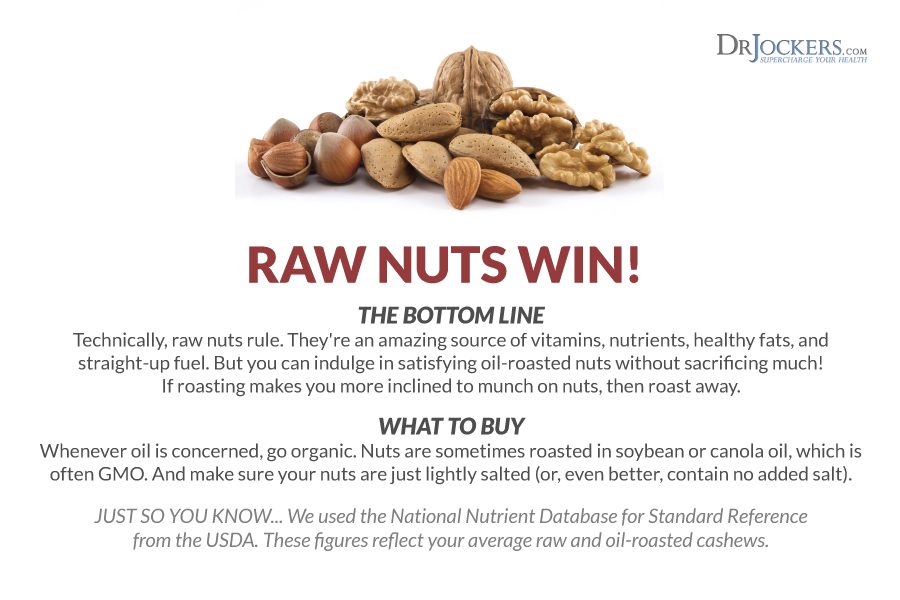
Fermented Foods
Fermented foods are powerful when it comes to your microbiome. They fill up your body with good gut bacteria that can help create a healthy gut flora balance, and help keep your body healthy.
My favorite fermented foods on a real food keto diet include kimchi, sauerkraut, pickles, coconut milk yogurt, coconut kefir, and low-sugar probiotic beverages. Find what fermented foods you enjoy the most and feel the best when eating them.
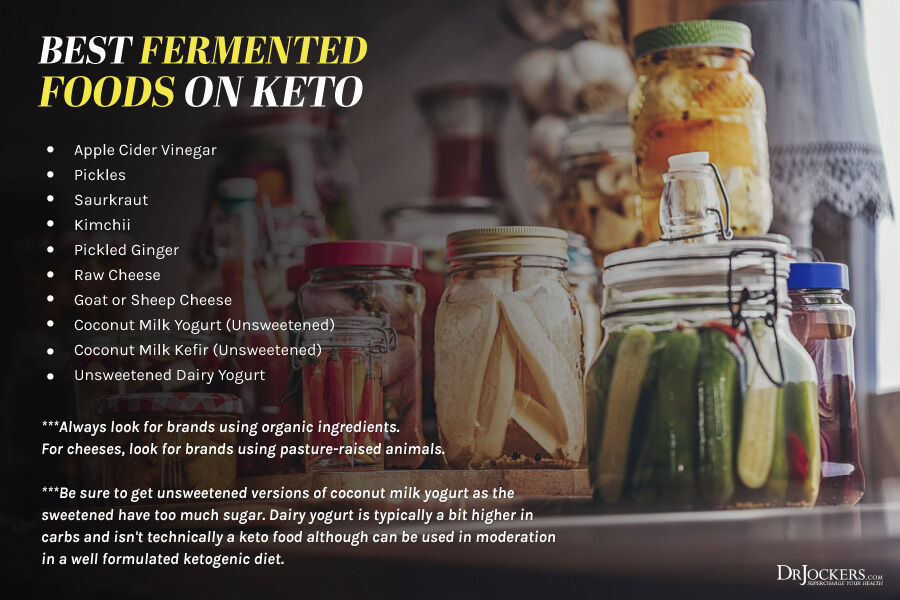
Natural Sweeteners on Real Food Keto
If you are interested in the real food keto diet, you may worry that you can’t enjoy sweets anymore. Don’t worry. You can still enjoy delicious treats, as long as you are smart about it, and choose ketogenic options with healthy, natural sweeteners.
Some excellent natural sweeteners you may enjoy occasionally include stevia, monk fruit, and sugar alcohols, such as xylitol and erythritol. Using these you may enjoy real food keto desserts, such as Keto Almond Butter Fudge Cups, Coconut Flour Keto Cookie Bars, and Turmeric Coconut Cream Cups.
If you want to learn more about how to eat a real food keto diet, read this article on the keto food pyramid.
Final Thoughts on Real Food Keto
The keto diet is gaining more and more popularity due to its health benefits including weight loss, reduced inflammation, improved fat burning, more energy, reduced cravings, clearer skin, and more mental clarity. It’s a diet that is very high in fats and very low in carbohydrates.
However, it is important that you not only focus on your macronutrients but also pay attention to your micronutrients. Eat nutrient-dense whole foods real food keto diet rich in micronutrients instead of relying on dirty keto foods, such as processed foods and processed meats. Follow this guide to ensure that you are eating a real food keto diet for optimal health benefits.
If you are looking for more great keto meal ideas than check out our complete Navigating the Ketogenic Diet program here
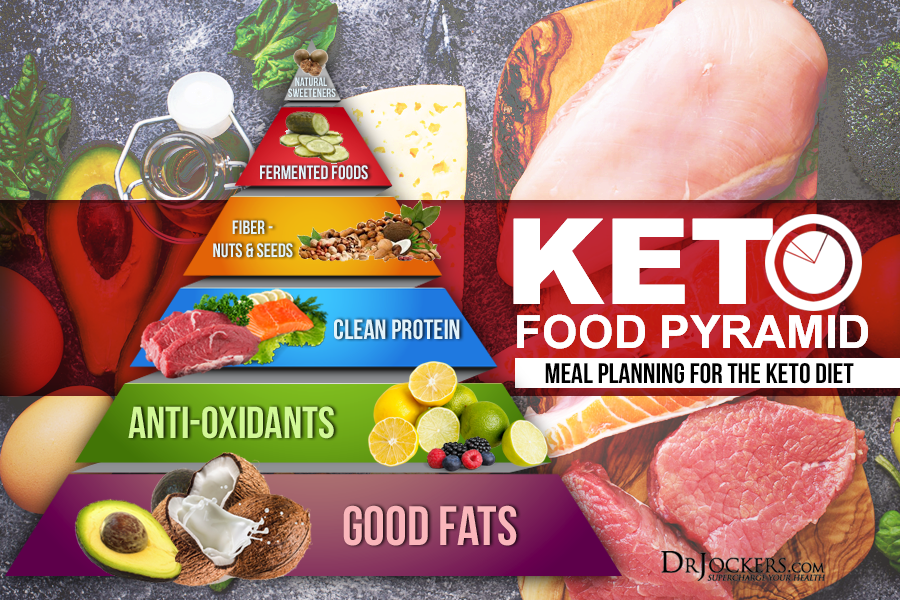

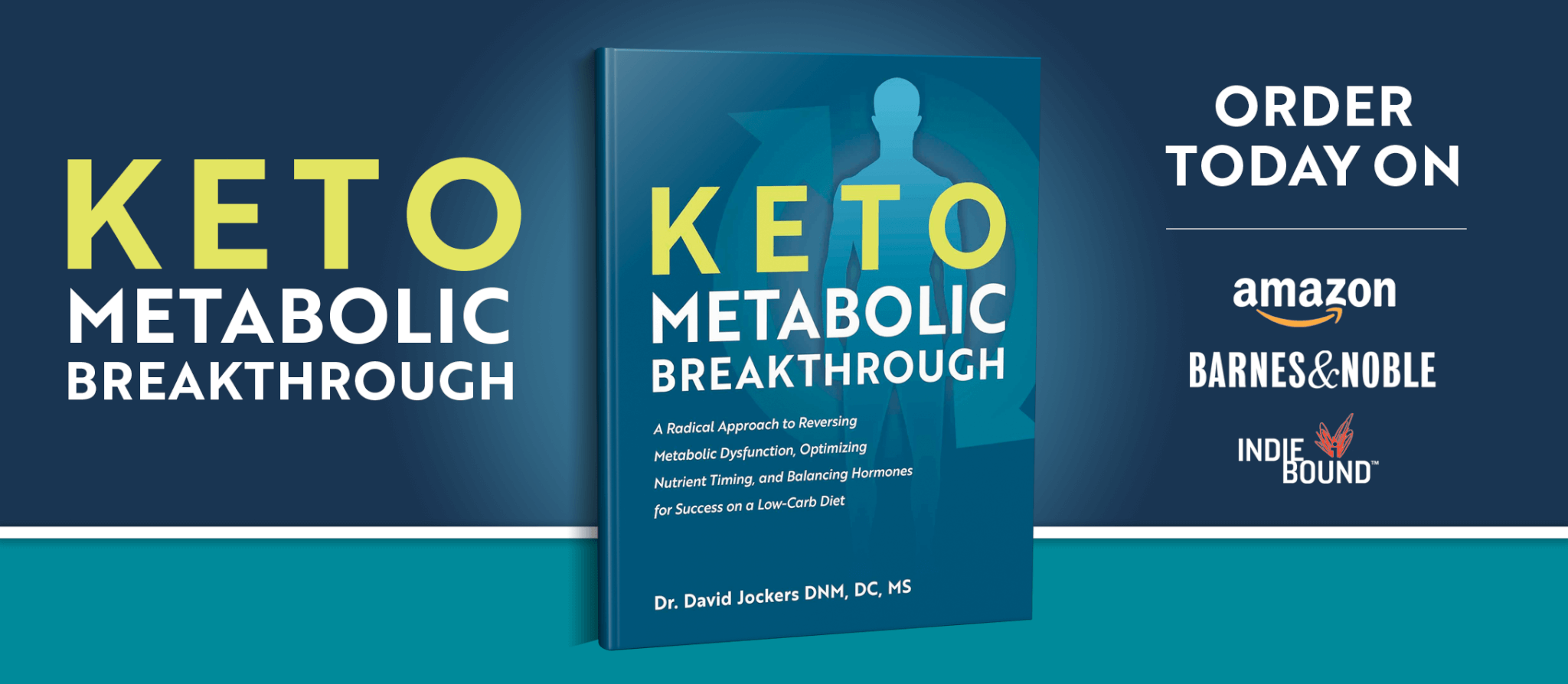


I understand your Keto diet. But I am Plant base. How can I do a keto Plant-based diet? I have multiple diseases. I have Type 2 diabetes, Lymphoedema of my left leg, Heart Failure, calcified gallstones, The Doctor says I have Rheumatoid Arthritis, but the test is negative, hair thinning, almost going. Digestive problems when I eat I get gassy. etc,etc, etc.
I am sorry to hear Antonietta! It sounds like there is a lot going on. I would recommend working with a functional health practitioner that will get to the root cause of the problems and customize a specific plan for your health needs! This article can help. There are many options for a plant based ketogenic diet. This article may interest you in which I address additional concerns at the bottom including diabetes.
A keto Diet alone cannot heal you if you don’t get some testing done to see where the issues are to target your nutritional true needs.. Highly recommend getting a GI Map Test to see what parasites, opportunist bacteria are interfering with the right functioning of the body. The NutrEval test can show levels of nutrients and what is off balance as well as on balance. I also like using non-invasive tests like Thermometry and whole body Thermography scans. If over 50, I don’t recommend going straight to colonoscopy when there are less invasive ways of showing what the gut is doing. Cologuard and Occult fecal tests can show using blood, urine and feces specimens to see what’s going on prior to invasive colonoscopy. On supplements, all labs that make them are not equal. Get on Health summits to review. For Dental recommend a biological dentist who will do a BioCompatibility Test to see what substances are needed if you have to have dental work done. Our teeth are linked to the organs so important to not overlook good dental practices.
Thanks for sharing!
Dr. Jockers, Can you recommend a functional doctor in the Atlanta area?
Hey Wendy, Yes, this article will help you find one. We offer virtual health coaching if you aren’t local to our Marietta location.
How about a functional doctor near Devon, PA or Malvern, PA who is educated in keto and practices it as well? I met one who knows you a few years ago but I lost his contact info. He was near Malvern, PA.
Hey Suzanne, This article can help you find a functional practitioner. Many now offer long-distance coaching so that you aren’t limited to your geographic location.
Doc,
I thought you’d know the doctor I was talking about or could come close. He works for the other group you worked with before you started on your own. I forget what it’s called.
Thanks, I found the doc I was speaking of on my own, a part of Maximized Living.
That is great to hear Suzanne! Maximized Living centers have an amazing health vision and well trained doctors in the 5 essentials of health! I am so happy for you!
Hello, Dr. Jockers. I am a faithful follower. As an integrative nutrition health coach, I find your articles and infographics very interesting and valuable. Are they shareable with my private clients and on my Facebook page?
Thank you for keeping us so well-informed!